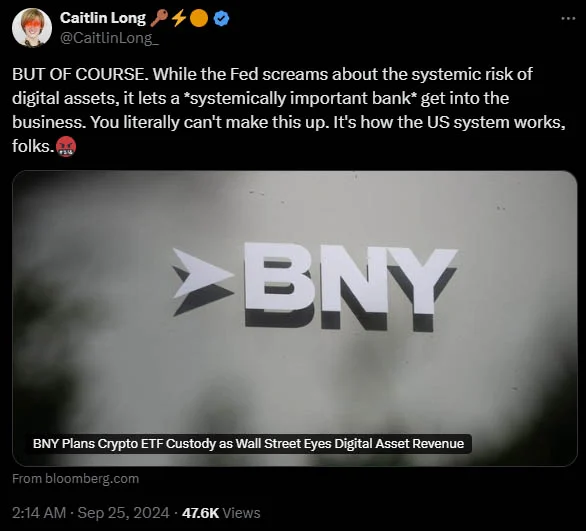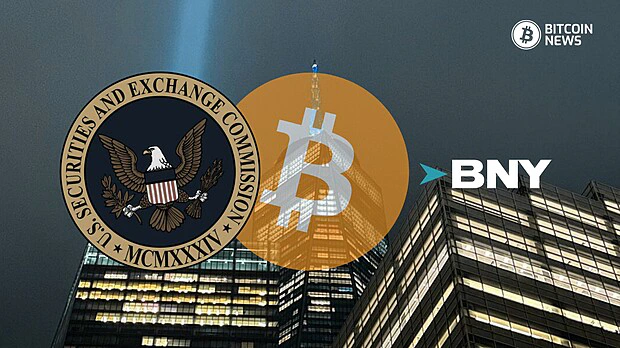In the evolving world of Bitcoin, BNY Mellon stands out as a key player, navigating the complexities of regulation while expanding its services in the digital asset space.
Recently, the bank made headlines for being granted an exemption from the U.S. Securities and Exchange Commission’s (SEC) controversial Staff Accounting Bulletin No. 121 (SAB 121).
This move that allows it to offer bitcoin custody services while avoiding some of the burdensome regulatory requirements that have troubled other financial institutions.
SAB 121 was introduced by the SEC as a response to the collapse of major digital-asset entities such as FTX and Celsius.
The regulation requires financial institutions that hold customer’s digital assets to list these holdings on their balance sheets, effectively recognizing them as liabilities.
This has created a chilling effect, dissuading many banks from providing bitcoin custody services due to the increased financial risk and regulatory scrutiny involved.
Critics argue that SAB 121 hinders banks’ ability to operate in the fast-growing digital asset market.
In a recent letter, a bipartisan group of 42 U.S. Congress members urged the SEC to reconsider this regulation, stating it conflicts with established accounting standards and could expose consumers to greater risks.
They emphasized:
“Both the House and Senate vote on H.J. Res. 109 sent a clear message from Congress to the SEC. Issuing staff guidance to impose policy changes is not appropriate and violates both the spirit and the letter of the Administrative Procedure Act.”
They urged the SEC to repeal SAB 121 and work with Congress to ensure Americans have access to safe and secure custodial arrangements for digital assets.
In Tuesday’s Congressional hearing, Congressman Tom Emmer claimed that SEC Chair Gary Gensler invented the term “crypto asset security” to hinder innovation in the Bitcoin sector.
Emmer argued that Gensler has employed this phrase to advance his regulatory agenda through enforcement actions against the Bitcoin industry over the last three years. He criticized Gensler directly, stating:
“You’ve made up the term crypto asset security. This term is nowhere to be found in statute, you made it up [and] you never provided any interpretive guidance on how crypto asset security might be defined within the walls of your SEC.”
Amid this regulatory upheaval, BNY Mellon has managed to carve out a niche for itself.
The bank was granted a significant exemption from the SEC, allowing it to bypass the burdens of SAB 121 while providing custody services for bitcoin.
This exemption is seen as a pivotal development in the Bitcoin space, as it positions BNY Mellon as a frontrunner in offering secure digital asset solutions.
The bank’s willingness to engage with regulators and adapt to the changing landscape of financial services has been a key factor in its ability to navigate the challenges posed by regulations like SAB 121.
The SEC’s decision to exempt BNY Mellon from SAB 121 has raised eyebrows in the financial community, with critics questioning whether this reflects an uneven regulatory environment.
While other banks have struggled to comply with the stringent requirements of the SEC, BNY Mellon appears to have found a way to thrive.
The Bitcoin community has strongly opposed this move.
Caitlin Long, CEO of a Bitcoin-friendly bank, criticized BNY Mellon’s entry into Bitcoin ETF custody and highlighted the Federal Reserve’s inconsistent stance on digital assets, questioning its systematic risk warnings while permitting major banks to participate.

While BNY Mellon is in a favorable position, the broader market for bitcoin custody remains challenging. Many banks are still hesitant to enter the space due to the risks associated with the SEC’s rules.
This reluctance is particularly concerning as institutional interest in bitcoin grows, driven by the approval of Bitcoin exchange-traded funds (ETFs) that are attracting significant investments.
Patrick McHenry, a congressional representative pushing for reforms to SAB 121, emphasized that the SEC’s strict regulations pose a challenge for numerous banks aiming to venture into the Bitcoin market.
He noted that it is crucial for financial institutions to possess the capability to securely and safely hold digital assets.
Without adequate regulatory clarity, many banks may continue to shy away from providing bitcoin services, limiting options for investors and hindering innovation within the industry.
Many argue that a lack of regulated institutional custodians for Bitcoin ETFs has lead to centralization in this area, with Coinbase currently serving as the custodian for 9 out of 11 US listed Bitcoin ETFs.
Related: BlackRock Tightens Bitcoin ETF Withdrawal Rules Amid Investor Concerns
The SEC’s regulatory stance on Bitcoin remains a hot topic, and BNY Mellon’s ability to navigate these waters effectively will be crucial to its success.
As Congress continues to push for changes to regulations like SAB 121, there may be opportunities for BNY Mellon to further enhance its role as a leader in the bitcoin custody space.
BNY Mellon’s exemption from SAB 121 demonstrates the bank’s agility in the face of regulatory challenges.
While many interpret this as a double standard in the industry, the bank’s proactive approach sets a standard for other financial institutions that are still grappling with the implications of bitcoin regulations.










